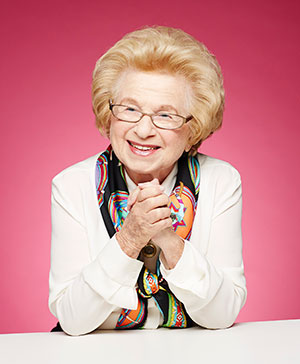American View
Personality
Dr. Ruth Talks Sex and the Holocaust With Millennials

Ruth Westheimer, a.k.a Dr. Ruth, is still at it.
The renowned sex therapist, now 90, has published several new books, including a graphic novel for children about her life. An updated version of her best-selling Sex for Dummies, targeted at millennials, is due out this summer. She’s active on Twitter and stars in a recently released documentary that introduces her to a new generation. The film tracks her dramatic life from German refugee child who lost her whole family after she was sent to Switzerland to escape the Nazis to soldier in pre-state Israel and her pioneering career speaking publicly on once-taboo subjects.
A life member of Hadassah, she says she is able to talk openly about sexuality because she is “very Jewish, and in the Jewish tradition, sex is not a sin but a mitzvah.”
This interview has been edited for brevity and clarity.
You have become much more public about your experience with the Holocaust in recent years—with your graphic novel, Roller-Coaster Grandma; in the new documentary, Ask Dr. Ruth; and with your involvement in helping to bring attention to a major Auschwitz exhibit currently at the Museum of Jewish Heritage-A Living Memorial to the Holocaust in New York City. Why has this become an important issue for you at this stage of your life?
It’s because I want to stand up against those deniers of the Holocaust and also those people who have Holocaust fatigue—those who say, “It’s so long ago, enough already.” There is no question that I’m a lot in the limelight, and I don’t forget where I came from. I talk a lot about my commitment to Israel and how important it is for the next generation to make sure they know what happened so it will never happen again. All the anti-Semitism in the world today makes me very sad. We all have an obligation to talk and teach about the Holocaust, to stand up and be counted.
RELATED NEWS: Read our coverage of the “Auschwitz” exhibit at the Museum of Jewish Heritage-A Living Memorial to the Holocaust
What is different about the sexual lives and relationships of millennials?
Women don’t ask anymore how to have an orgasm—they have learned it or can get it from the internet—and men don’t ask about premature ejaculation. People have more questions about how to find somebody, so I’m talking more about relationships and loneliness. Loneliness is for all ages, but for millennials—they are going to lose their ability to have a good conversation because they are constantly on their phones.
What is the most important advice you can give to a 20- or 30-year-old looking for a relationship?
My message is not to wait because they think there is something better around the corner, but to find somebody they can share their lives with now. I’m all for internet dating so people can find a partner. But people have to be smart about it, only meet in public places and don’t focus so much on looks. A little bit of looks is important but to concentrate only on looks is a big problem. I still believe in official shadchanut, matchmaking.
Do you think your grown son and daughter would describe you as a typical Jewish mother?
No, I didn’t do the dinners at home; my late husband Freddie did a lot of the cooking. They don’t have any complaints. I kept the sex talk out of the home as much as I could. I didn’t think it was my place to educate my grandchildren, either. For my own two children, I left books around so they could ask questions.
You are quoted in your new documentary, saying: “I have an obligation to live large and make a dent in this world.” What is the biggest dent you have made?
I have four grandchildren. Hitler lost and I won. The reason I have to make a dent is because I’m one of the few children who survived. I knew I had an obligation to do something, but I did not know that that obligation would be to be a sex therapist.
Lisa Hostein is the executive editor of Hadassah Magazine.










 Facebook
Facebook Instagram
Instagram Twitter
Twitter
[…] such high-profile figures as Ruth Westheimer, the German-born sex therapist known as Dr. Ruth who died last July, and the Hungarian-born British memoirist Lily Ebert, who had two […]